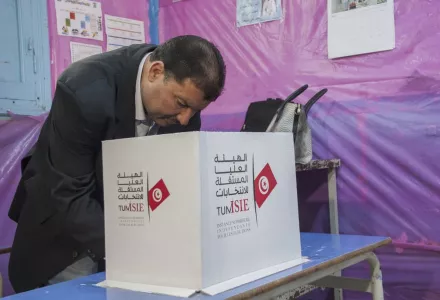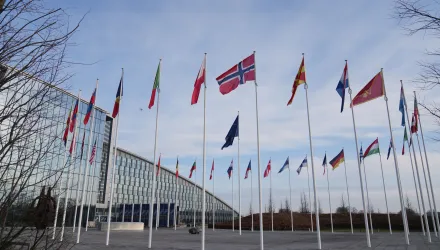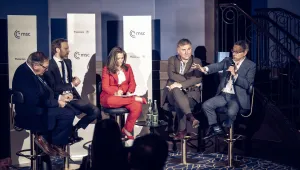
On May 6, Tunisian citizens will finally head to the polls for the country’s first municipal elections since its 2011 popular uprising. Voters will cast ballots in all of the country’s 24 governorates for 7,212 available council seats in 350 municipalities, including 86 new municipalities created since 2015. Delayed twice since originally planned in 2016, these elections are another milestone in Tunisia’s tumultuous ongoing transition.
What’s at stake
Tunisia hosted a highly centralized political system under former president Zine El Abidine Ben Ali and the ruling party, the Democratic Constitution Rally (RCD). Eighty percent of municipal council seats were legally guaranteed to members of the ruling party, and the president of the municipality was required to be a member of the RCD’s local coordination committee.
On paper, municipal councils were primarily tasked with economic development. But in reality, RCD domination meant that municipal governments served to channel money, jobs and public services toward loyal regime supporters and party members. As a result, municipalities served as a political tool and facilitated the development of severe regional economic inequality, dividing the country into an impoverished south and interior and a highly developed capital and Sahel region, strongholds of the RCD.
Today, municipal councils still largely function as they did before 2011 despite superficial changes. The national government disbanded municipal councils and replaced them with special delegations to govern until elections could be held, but these delegations reflected the wider partisan problems of the transition period. Tunisia’s Assembly of Representatives passed the Code on Local Authorities, the law outlining the responsibilities of local government, only last week after nearly three years of debate. The law implements chapter seven of Tunisia’s January 2014 constitution, which mandated governmental decentralization in an effort to establish local democracy.
And for the next phase of the Tunisian transition to succeed, local governance will be crucial. While the initial transition period focused on identity issues related to the relationship between religion and the state, recent developments have turned attention to the country’s persistent regional inequality.
Subnational governmental institutions are more responsive to the demands of their constituencies. Local representation and input from citizens reveal a more accurate narrative of constituent demands and, in turn, can increase government effectiveness. If adequately funded and filled with politicians committed to reducing corruption, these local institutions can serve as a catalyst for meeting each region’s needs.
What voters want
Economic justice was a central demand of the 2011 uprising, and public opinion data from the Arab Barometer collected in 2011, 2013 and 2015 demonstrate that the economy remains at the forefront of Tunisians’ minds. When asked, “What are the most two important challenges your country is facing today?” nearly 75 percent of respondents listed the economic situation with regard to poverty, unemployment and price increases, as one of those two challenges. Though significantly less than the 89 percent of respondents who chose the economy in 2013, it was also up from the 69 percent who responded similarly in 2011. In an exit survey I conducted with fellow political scientist Chantal Berman during the 2014 parliamentary elections, an overwhelming majority of voters similarly chose “economic growth and development” as the No.1 issue facing Tunisia.
The national government has failed to enact meaningful economic change since 2011. In January, the government released a new budget, including significant tax increases on staples like food and fuel, spurring protests and clashes with police. In fact, 87 percent of protests in 2016 surrounded socioeconomic issues such as employment, worker protections, the cost of living and state social welfare programs.
Tunisians have grown increasingly convinced that economic development and democracy are not necessarily compatible. When asked to what extent they agreed with the statement “Under democracy, economic performance is weak,” 17 percent of respondents agreed or strongly agreed in 2011, according to the Arab Barometer. However, by 2015, more than 45 percent of respondents agreed or strongly agreed with the same statement.
This suggests Tunisians may increasingly view economic development and democracy as distinct choices rather than reinforcing factors. When surveys explicitly pit support for economic change as a trade-off with security sector and political overhauls, respondents’ demands for economic concerns heartily trumpthose for all other kinds of change.
What parties are offering
The electoral lists represent 25 Tunisian parties, but only three, similar to the 2014 parliamentary elections, have credible national reach. Nidaa Tounes, the ruling party, and Ennahda, the Islamist opposition to the former regime, will both field lists in each of the 350 constituencies. The Popular Front, a coalition of leftist parties formed in 2012, ranks third, fielding 132 lists.
In 2014, Nidaa Tounes and Ennahda offered similar economic promises talking vaguely about “growing the economy.” While in power, both continued the neoliberal approach of Ben Ali’s authoritarian period. For the 2018 municipal elections, the platforms vary more by region than by party.
For example, all platforms reference in some way the importance of municipal councils in fighting corruption and achieving economic development. But in the rural Tajerouine municipality, both Nidaa Tounes and Ennahda’s platforms heavily featured language about local participation, government accountability and equitable development, listing specific public infrastructure projects. These platforms seek to appeal to voters who desire a solution to the country’s regional inequality.
Meanwhile in Tunis 1, an urban district in the capital, Ennahda’s platform included reforming public health clinics and providing public swimming spaces. The party stressed its plan to study houses built on public land on a case-by-case basis rather than undertaking a sweeping policy, perhaps in an effort to cater to the urban poor whose unregistered properties would be most affected. In the same district, the head of the Nidaa Tounes list discussed projects aimed at reducing both street dogs and mosquitoes, programs that appear to cater to an upper middle class more prevalent in the city.
These party platforms seem to signal that municipal elections are pushing Tunisia’s leading parties to become more responsive to citizens’ concerns. But whether the national government will continue to empower municipalities to pursue these programs remains to be seen.
Elizabeth R. Nugent is a postdoctoral research fellow with the Middle East Initiative at Harvard Kennedy School of Government’s Belfer Center for Science and International Affairs and will join Yale University as an assistant professor of political science in July 2018. You can follow her on Twitter @ernugent.
Article originally published @ The Washington Post
Nugent, Elizabeth. “Tunisia’s first post-uprisings local elections are Sunday. Can they bolster citizens’ belief in democracy?.” May 4, 2018




